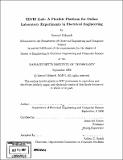| dc.contributor.advisor | Jesus del Alamo. | en_US |
| dc.contributor.author | Gikandi, Samuel | en_US |
| dc.contributor.other | Massachusetts Institute of Technology. Dept. of Electrical Engineering and Computer Science. | en_US |
| dc.date.accessioned | 2008-05-19T15:59:23Z | |
| dc.date.available | 2008-05-19T15:59:23Z | |
| dc.date.copyright | 2006 | en_US |
| dc.date.issued | 2006 | en_US |
| dc.identifier.uri | http://hdl.handle.net/1721.1/41601 | |
| dc.description | Thesis (M. Eng.)--Massachusetts Institute of Technology, Dept. of Electrical Engineering and Computer Science, 2006. | en_US |
| dc.description | Includes bibliographical references (leaves 81-83). | en_US |
| dc.description.abstract | This thesis describes a project that is part of the collaboration between MIT and universities in sub-Sahara Africa to exploit the value of iLabs in the developing world. The main goal of this project is to develop software that will exploit the value of the National Instruments Educational Laboratory Virtual Instrumentation Suite (ELVIS) system in Africa by integrating it into the iLabs shared architecture, while taking into consideration the special circumstances surrounding the deployment of iLabs in Africa such as bandwidth limitations, limited access to networked computers and lack of computer skills on the part of students. Integrating ELVIS into iLabs will facilitate the rapid deployment of new online labs to augment the Physics and Electrical engineering curricula in these universities. iLab development efforts for this project are being done in parallel with developers at the Obafemi Awolowo University (OAU) in Nigeria. One of the main goals of the new system is to fill the gap of laboratory experiences in introductory level electronics and physics classes, which are hardest hit by the lack of equipment due to their typically large enrollment. Our goal is to support the development of electronic circuit building skills by providing an environment where students can easily try different circuit configurations before submitting experiments for execution. We are therefore investigating new iLab client user interface designs that will enable students to create and edit circuit schematics from provided electronic components. Our ELVIS iLab design will also formalize and simplify the process of creating and administering such labs for instructors, thereby speeding up the deployment of new labs in an environment where software development skills are not at a premium. | en_US |
| dc.description.abstract | (cont.) This will be achieved by recycling many of the components that are currently behind the success of the microelectronics weblab, which have already been adapted before for new iLabs. Besides reusing existing software, the project hopes to make a major contribution towards enhancing students experiences with iLabs through its new interactive client design. | en_US |
| dc.description.statementofresponsibility | by Samuel Gikandi. | en_US |
| dc.format.extent | 83 leaves | en_US |
| dc.language.iso | eng | en_US |
| dc.publisher | Massachusetts Institute of Technology | en_US |
| dc.rights | M.I.T. theses are protected by
copyright. They may be viewed from this source for any purpose, but
reproduction or distribution in any format is prohibited without written
permission. See provided URL for inquiries about permission. | en_US |
| dc.rights.uri | http://dspace.mit.edu/handle/1721.1/7582 | en_US |
| dc.subject | Electrical Engineering and Computer Science. | en_US |
| dc.title | ELVIS iLab : a flexible platform for online laboratory experiments in electrical engineering | en_US |
| dc.title.alternative | Flexible platform for online laboratory experiments in electrical engineering | en_US |
| dc.type | Thesis | en_US |
| dc.description.degree | M.Eng. | en_US |
| dc.contributor.department | Massachusetts Institute of Technology. Department of Electrical Engineering and Computer Science | |
| dc.identifier.oclc | 214329575 | en_US |
